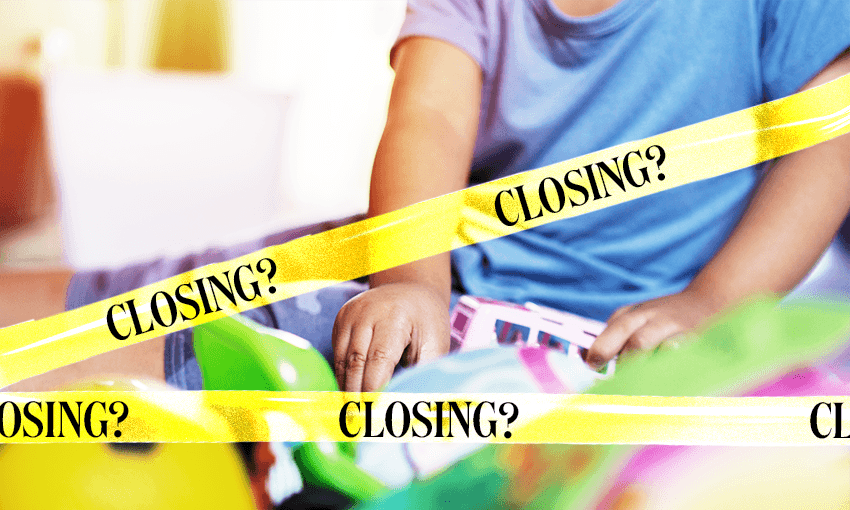Closing its early childhood services may end up costing the council, while also taking away a vital community resource.
On the Facebook page for Kauri Kids, the network of council-funded community early childhood education centres across Auckland, things seem rosy. Children experience sustainability by playing with shredded paper; they make sandpit volcanoes with multi-coloured lava; they clamber over brightly coloured miniature playground equipment.
But with Auckland’s budget due to be voted on by councillors tomorrow, these centres may soon be gone. While edits to the budget last week offered the option of selling the council’s airport shares to fund social services, arts, and increase bus driver pay, restoring funding for Kauri Kids was not among them.
The justification is that closing the childcare network, which operates in 10 locations at council-owned leisure centres around Auckland, will save the council a million dollars a year. It’s accounting that doesn’t make sense to NZEI, the education union, which has been protesting the closures since the draft budget was released last year. “Closing Kauri Kids will have little to no savings for ratepayers,” said NZEI early childhood representative Sandie Burn in a press release.
While removing the centres would save on operating costs, new private tenants would have to be found for the spaces Kauri Kids currently occupy, and the council would have to pay out redundancy pay nearly equivalent to the suggested savings, as many of the ECE teachers at the centres have collective contracts.
It’s a frustrating situation, says Jessica McLean, a parent at Kauri Kids in Stanmore Bay. “I was drowning at home, my kids were isolated after Covid lockdowns,” she says. “The level of care I receive from Kauri Kids is amazing – they put ice in my kids water bottles when it’s hot.” The centres provide a particularly important service, offering childcare for children under the age of two, which not all early childhood education centres do.
The affordability is crucial: run as not-for-profits, the Kauri Kids centres are among the cheapest early childhood education available in Auckland. The low cost, combined with the supportive environment, is what made it possible for McLean to send her kids to the Stanmore Bay centre. “We don’t have many other options [that take kids under two] for the same price – people across Auckland are freaking out.”
NZEI has pointed out that the losses the centres are making are marginal, and could change with a fee restructure. “The provision of low-cost, high quality ECE that caters for all children – including those with high needs which can’t be met at many for-profit centres – is an important community service,” NZEI secretary Stephanie Mills wrote in an open letter as part of the union’s Auckland budget submission.
McLean especially appreciates that at Kauri Kids her two kids can be together, in the same room; if the centres close, her son and daughter, two years apart, will have to go to different centres – adding another burden to her and her partner to do drop-offs and pick up, and preventing the siblings from spending time together. And that’s if her kids can get through the months-long waiting lists for many local centres, which have less flexible hours and often cost more.
Kit Arkwright, a parent at the Takapuna centre, says that he would be “pretty devastated” if it closed. His daughter is well settled now. “When it was announced last year [that the centres might close] we tried another kindy, and it didn’t work out.” After months of uncertainty, he’s worried about the potential disruption for his family. “My request is to give the centres a chance to adapt, to find savings, to restructure the fees, to become viable,” he says. “I know there’s a need to be pragmatic, but even if it does save a million dollars, it’s not going to make much of a dent in the $375m hole.”
“The council has a wonderful resource, and I don’t know why they would squander it,” says Mclean. “I’m not asking the council to fund my kid’s daycare; I’m just saying, please be transparent with the numbers – if it really does cost ratepayers a million dollars I don’t know why you wouldn’t do it properly, get experts involved.”
An alternative to closing the centres would be transferring them to be organised through the local board and run as a community crèche, run with support of parents. But McLean says that while this might be good, it could just put more pressure on already overloaded working parents.
If nothing else, McLean says that the voice of her children should be listened to. “My one-year-old runs to the door when I say it’s time for Kauri Kids… my daughter says “can I go to Kauri Kids” when we’re at playcentre together, and playcentre is like her second home; she loves it so much she’d rather be there even if she’s apart from me.”
The final version of the budget, including the Kauri Kids decision, will be announced after Auckland Council’s governing body votes it through at a meeting on Thursday.



